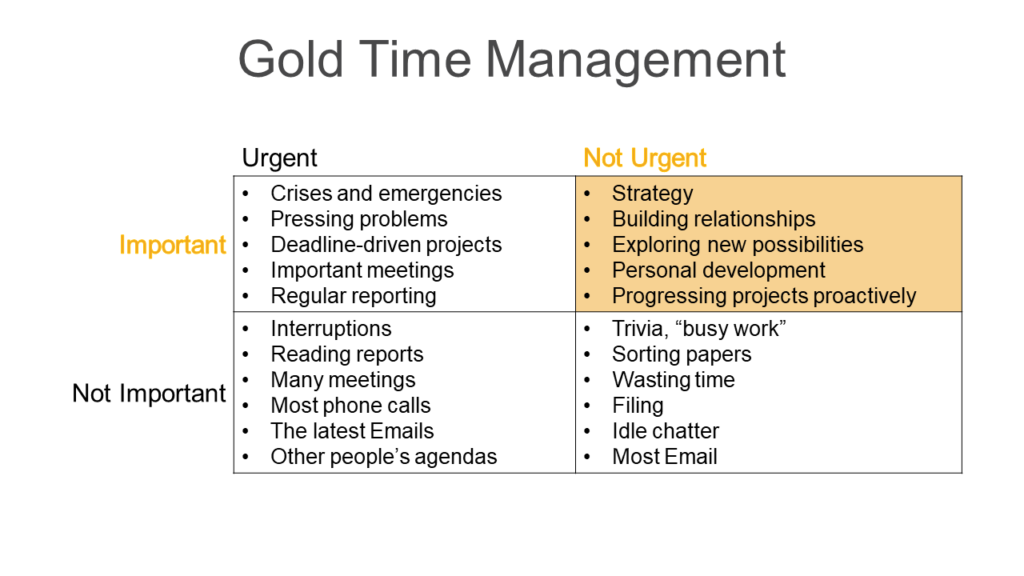There are a couple of things I have noticed recently, even more so with my delegates, and that is the tendency to focus on either or both of the following:
- Tasks with the shortest deadlines
- The most recent task to arrive, be it an email, a message, or an interruption through one of their channels.
Both situations, in most cases, pay scant regard to what is important and everything to the allure of urgency. You know how the saying goes, “You get more of what you focus on.”
This then leads to a perpetual cycle that gets bigger and bigger and leaves little room, if any, for what is important.
I had the privilege recently of working with a colleague, Michelle Santaferraro, who in a discussion with a delegate said, “…what we allow we create…”
Now, I have heard this phrase before, but it had not stuck with me – yet on this occasion, it resonated. It is so true –. When we let things happen and allow these things into our lives, we create this condition that causes so much stress and overwhelms us and a feeling of sometimes being out of control.
For example, feeling compelled to check or answer emails immediately, even though this may not be necessary. Doing what everybody else asks of you (because it helps them achieve what they want to achieve) at the expense of you doing what matters most to you.
Fresh with this insight ringing in my ears, I started to think more about how I can take control over and focus more on what is important.
One of the principles that underpin our teachings at Interaworks is Gold Time Management. This principle places a bit more focus on control and will help create a much better working condition; one where you feel more fulfilled, you are working on what you should be working on, and you are delivering what you need to deliver.
So, let us look deeper at what we mean by Gold Time Management and then look at ways to help us be more intentional about what we spend our time on.

Many of us will have seen this time management model or something similar. The reality is that investing in gold time gives you a 10-fold return on your outlay. As an ex-banker that makes this a very sound investment indeed.
I want to start by being crystal clear about what constitutes gold time activities, and to do this we need to define what we mean by ‘Important’ and ‘Urgent’.
Important – is critical to success in your role. This does not only apply to work but in any role, in your life — parent, partner, or community leader amongst many others.
Urgent – demands your immediate attention. Usually, because there is an unpleasant consequence if you do not. This could be a complaint, a break in a process or a legislative breach and so many more.
With these two definitions clear in your mind, ‘Gold Time’ is all about those activities that are critical to your success but that are not necessarily time-bound. However, the caveat here is that if you never find the time to do them, then the consequences will come back to haunt you and could be very damaging to you personally and or professionally.
So let me try and illustrate this. Relationship building or networking is a gold-time activity. You do not have to do it right this minute or even tomorrow, but if you keep putting it off, then you become more detached from people, you lose contact, they do not know you, you don’t know them. You miss out on potential opportunities in the future.
So, my first piece of advice is to take back control of your time. It is your time and you need to be a zealot and guard it. Why? Because if you do not, somebody else will come along and steal it – take it from you and replace it with something that is usually important to them but not to you. If you allow people to steal your time, then this is something you have created — you have permitted to allow this other person to have free reign with your time. Is this what you want?
Let me illustrate time zealousness concerning, a meeting invitation you accept. There is no agenda. You are not clear what the meeting is about. You accept because it must be felt by others that you need to be there. Attending this meeting means you will not be able to complete the next stage of your project which you had planned to do, but not to worry, you will find some time either later or tomorrow you hope. You have put the needs of others in front of yours without being clear that these needs are more important than yours. Is that the state you want to create?
Looking at everything you have on your plate through the lens of ‘importance’ and ‘urgency’ will help you see how you are using your time. This exercise can be truly eye-opening and enlightening. Many a time I have delegates comment that just stepping back for a few moments and looking at how they allocate their time teaches them so much. You cannot always see this when you are stuck in the work.
Einstein once famously said, “You can’t solve problems with the same thinking that got you there.”
You need to create space to allow this alternative thinking and gold time is critical for this.
My second piece of advice would be to block out time in your calendar for these gold-time activities. Research shows that scheduling when and where you will do something makes it dramatically more likely that the task will get done. These are appointments with yourself to do what matters most to you will be far more beneficial, valuable, and less frustrating than most meetings you attend! But do not get me started on meetings as this, I am sure, will be the topic of another blog!
Carve out chunks of time. Some people prefer large chunks; others prefer smaller more regular chunks. Mix it up maybe, react to whatever you have on your plate which then makes it feel more organic and intentional rather than prescribed – do whatever works for you, but do it.
One of the best practices we advocate and teach is a Weekly recharge where you set time aside each week to review the past week and plan the forthcoming week. This is extremely powerful and will be the most valuable 90 minutes you spend at work. And what are 90 minutes in the context of the number of hours you work per week? It is much less than 0.03% of your time which is a tiny price to pay for the unquestionable return – again, another sound investment decision in my mind.
My third piece of advice is to get better at saying “no” and to do this you need to practice it more because many of us find this hard.
One of the biggest ways we waste our time on unimportant tasks is the inability to say “no”. It is okay to say “no”. It is okay to say you cannot do something. It is okay to have boundaries. If you do not set boundaries, anything goes.
Saying “yes” to one task is saying “no” to another. When you say “yes” to an unimportant task, you are saying “no” to one of your more important tasks. Is this the condition you want to create?
I have found it easier, and you may also, to say “no” to the task and not the person.
So, when asked to do something that is not important to you, ask yourself:
- “Do I have the time to do it?” – remember will it stop you from doing something that is important to you?
- “Am I the right person?” – how does this fit with my goals and objectives?
- “Is there someone else better suited?” – or am I asked because I always say yes and then stress to get my own work done?
How then do you communicate this? Here are some examples:
- “I’m sorry, I can’t do that analysis this week. I can do it for you next Tuesday after month-end is complete.”
- “I’m sorry, I can’t take on doing this analysis regularly because my boss wants me to focus on and prioritize development work. But I know my colleague is working on developing his Excel skills. Would you like me to show him how to extract the data so he can take this on?”
- “I could run that report, but I wonder what information you want from it. If it is the attrition rate you are after, would one of the measures in the monthly HR Excellence Report we publish give you what you need?”
I’m sure that demoting your gold time is not a state you want to create and yet we so easily do this and then wonder why we don’t achieve what we want to achieve. Remember to follow these tips:
- Take back control of your time – it’s your time and you have the ultimate say on where and when to use it.
- Physically block out time in your calendar for gold time activities – these will be the most productive times of your day.
- Get better at saying “no” – but remember it is the task you are saying no to, not the person.
Allowing yourself to undertake these actions will create a gold-edged return on your investment.
Author – Julio Arquimbau
Facilitator
About InteraWorks
InteraWorks is a global learning company on a mission to elevate the human experience at work. Specializing in professional development and performance enablement, we offer top-rated learning programs based on four defined conditions that must exist for individuals, teams including Effective Edge, Best Year Yet, and the Essentials series. Our integrated learning framework and online tools generate immediate and sustainable breakthroughs in performance. Through decades of working at all levels in enterprise companies across many industries, we’ve built a reputation for helping people and organizations harness their focus, mindset, talent, and energy to produce results that matter most.
We’ve defined four conditions that must exist for an individual, team, or organization to be effective within the arena of performance and development; Accountability, Focus, Alignment, and Integrity. We’ll continue to explore these and more in our blog and look forward to your engagement and interaction with us. Stay tuned as we engage the edges.

